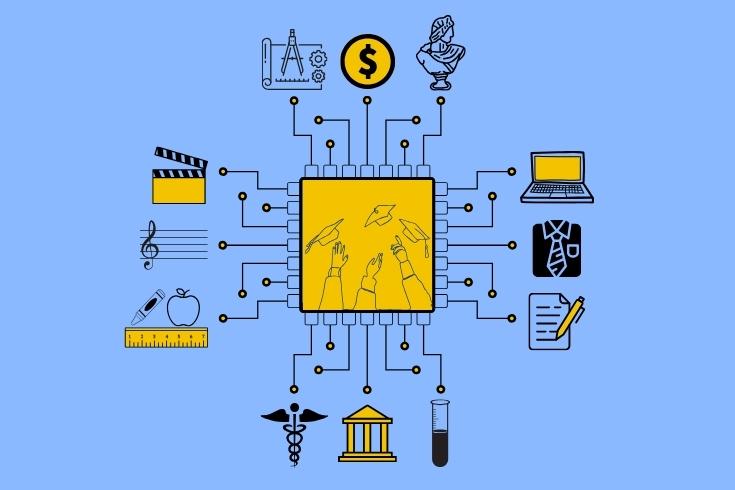AI in the Job Search

Artificial Intelligence (AI) is taking the world by storm, though luckily not in the Skynet (Terminator) way. Instead, tools are popping up all over the web focusing on varying uses from teaching new topics to helping finish writing assignments. Recently, AI has gone a step further to help users apply for jobs and internships. But should you use it for this? And what are the pitfalls to avoid?
To Find Jobs
There’s more to AI than writing papers (not that you’d use it for that academically); it can be a good resource for fine-tuning your search for open positions.
ChatGPT won’t be as helpful here, but Google Bard can search the web to give you accurate, real-time information. This includes when applications close and direct links to apply. We recommend asking about a specific job/internship title in an area of interest which can help narrow down the search.
Once you’ve found positions that interest you, Careerflow will help you keep track of all of your applications. There’s a browser extension you can download to catch and save positions in a workspace and update your progress on the applications. Careerflow also offers a LinkedIn evaluation—and other services—at a cost.
On Application Materials
Sure, using AI for your resume or cover letter can help save time, but copy-pasting the AI-generated materials can actually hurt your chance of getting a position!
AI has a tendency to be full of errors, sound robotic, and easily catchable which can result in you being removed from the applicant pool. Instead, we recommend tailoring your resume and cover letter for each application to add a human touch that an AI-generated application is missing.
Use ChatGPT, Google Bard, or Rezi to get started before sending your material over to a place like Hiration for more detailed advice and the option for it to be reviewed by one of our Hiatt Advisors.
Jobscan is another program that can review your application materials. However, this one is formatted to help get you past Applicant Tracking Systems (ATS). While useful if you’re applying to bigger organizations that use ATS to field resumes, we still recommend coming in for a Hiatt Advisor review before applying.
Preparing for Job Interviews
You might have plugged a job into ChatGPT and asked for interview questions hoping that something more than the traditional bland responses would be generated. Unfortunately, what you often get back lacks any kind of specificity.
Instead, try using Prepper. This tool generates company-specific and job-specific interview questions based on a job description you provide. It’ll also provide feedback on your answers so you can improve as you move along.
Career Changes
If you’re looking to make a career change, AI can come in handy. NAV generates a score for each job or job offer you feed the tool. This score can help you determine your best next move to make to improve your career trajectory.
When you have that new job in hand, Rezi can then craft an excellent resignation letter. By plugging in some basic information, this tool can help write a letter that maintains positive relations with your workplace, taking the stress out of resigning.
Avoid Overuse
All of these AI tools can certainly come in handy, but hiring managers often warn about their overuse by candidates.
For example, using only AI may make you miss some job or internship opportunities that are posted. Also, ChatGPT and Google Bard search the web but often target big-name companies that are easier to recognize and find.
At Hiatt, we always recommend using our additional resources and conducting some research yourself!